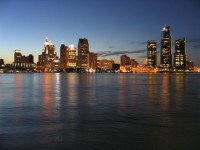-
 Assisted Living Costs in Detroit, MI
Assisted Living Costs in Detroit, MICost for a single bedroom in Detroit runs between $847 to $3,500 a month.
Availability is almost guaranteed but you can request information online by filling out the form to the right or call us at 855-363-2002 for a no-cost, in-depth assessment of your senior care needs. Our compassionate advisors can help you find the best Detroit assisted living facilities for your unique needs and budget.
The official website for the city of Detroit is http://www.detroitmi.gov/.
Cities near Detroit offering memory care options
River Rouge | Hamtramck | Highland Park | Dearborn | Hazel Park | Ferndale | Warren | Melvindale | Pleasant Ridge | Ecorse | Center Line -
Assisted Living Costs in Nearby Cities
* The costs above represent the AVERAGE monthly cost of assisted living for a one person bedroom in that city. -

Facts about Detroit
Detroit is also known as: Motor City, Hockeytown, Arsenal of Democracy, Motown, and The D.
Detroit has been featured in movies like: Sicko (2007), 8 Mile (2002), Hoffa (1992), and RoboCop (1987).
And some of the notable people born here have been: Sid Meier (game designer and programmer), Jeffrey Sachs (scientist and economist), Jeffrey Eugenides (writer and novelist), Wendy Hamilton (actor and model), William Clay Ford, and Jr. (businessperson).
Detroit is home to the following sports teams: Detroit Tigers, Detroit Lions, and Detroit Red Wings.
Popular neighborhoods in Detroit include: Arden Park-East Boston Historic District, Atkinson Avenue Historic District, Black Bottom, Boston-Edison Historic District, Brush Park, Cass Corridor, Corktown Historic District, Cultural Center Historic District, East Ferry Avenue Historic District, Delray, Eastern Market, Detroit, Grand Circus Park Historic District, Greektown, Detroit, Indian Village, Lafayette Park, Detroit, New Center, North Corktown, Parkland, Poletown, and Virginia Park Historic District.
And featured attractions of Detroit: Hamtramck, Highland Park, Fox Theatre, Scarab Club, and Fort Wayne.
More about assisted living in Detroit
Whether you are looking for an intimate residential care home or a larger continuing care assisted living facility, we'll help you find the best assisted living in the Detroit, Warren and Livonia areas. Some important factors to consider when evaluating assisted living facilities include proximity to high quality hospitals and medical care, and proximity to friends and family. The Detroit area includes several surrounding cities that may offer better options for assisted living including Garden City, Highland Park, Washington Township, Sterling Heights, Davisburg, Berkley, Plymouth, Roseville, Inkster, Highland, New Baltimore Ferndale, Commerce Township, Auburn Hills, St. Clair Shores, and Romulus. The areas of Allen Park, Oxford, Rochester Hills, Melvindale, Woodhaven, Madison Heights and White Lake are also included in the great Detroit area.
Detroit is represented by City Council Mike Duggan.
Detroit and a nine-county Combined Statistical Area (2010 Census population of 5,218,852, area of 5,814 square miles [15,060 km2]). The Detroit-Windsor area, a commercial link straddling the Canada-U.S. border, has a total population of about 5,700,000. The Detroit metropolitan region holds roughly one-half of Michigan's population.Known as the world's automotive center, "Detroit" is a metonym for that industry. Detroit's auto industry, some of which was converted to wartime defense production, was an important element of the American "Arsenal of Democracy" supporting the Allied powers during World War II. It is an important source of popular music legacies celebrated by the city's two familiar nicknames, the Motor City and Motown. Other nicknames arose in the 20th century, including City of Champions, beginning in the 1930s for its successes in individual and team sport; The D; Hockeytown (a trademark owned by the city's NHL club, the Red Wings); Rock City (after the Kiss song "Detroit Rock City"); and The 313 (its telephone area code).Due to industrial restructuring and loss of jobs in the auto industry, Detroit lost considerable population from the late 20th century to present. Between 2000 and 2010 the city's population fell by 25 percent, changing its ranking from the nation's 10th-largest city to 18th. In 2010, the city had a population of 713,777, more than a 60 percent drop from a peak population of over 1.8 million at the 1950 census. This resulted from suburbanization, industrial restructuring, and the decline of Detroit's auto industry. Following the shift of population and jobs to its suburbs or other states or nations, the city has focused on becoming the metropolitan region's employment and economic center. Downtown Detroit has held an increased role as an entertainment destination in the 21st century, with the restoration of several historic theatres, several new sports stadiums, and a riverfront revitalization project. More recently, the population of Downtown Detroit, Midtown Detroit, and a handful of other neighborhoods has increased. Many other neighborhoods remain distressed, with extensive abandonment of properties. The Governor of Michigan, Rick Snyder, declared a financial emergency for the city in March 2013, appointing an emergency manager. On July 18, 2013, Detroit filed the largest municipal bankruptcy case in U.S. history. It was declared bankrupt by Judge Steven W. Rhodes of the Bankruptcy Court for the Eastern District of Michigan on December 3, 2013; he cited its $18.5 billion debt and declared that negotiations with its thousands of creditors were unfeasible. On November 7, 2014, Judge Rhodes approved the city's bankruptcy plan, allowing the city to begin the process of exiting bankruptcy. The City of Detroit successfully exited Chapter 9 municipal bankruptcy with all finances handed back to the city at midnight on December 11, 2014.
-
Population shifts in Detroit
-
Average temperatures in Detroit
Line in orange is average highs...line in blue is average lows.
Average rainfall in Detroit
Detroit Michigan Assisted Living Facilities
St Joseph's Manor
Vegetarian food is provided, residents can self manage their diabetes, staff can help residents monitor their blood sugar, St Joseph's Manor is close to major bus lines, full tubs are available, hospice is an option available at this location, and the community is licensed for 104 residents.Passion and Caring Home
The minimum allowable age of residents is 60, nurses are on staff, staff can help residents monitor their blood sugar, caregivers at Passion and Caring Home can address potential disorientation presented by residents, trained staff can administer injectable medication, the community has a nurse that is able to administer injectable medicine, and the property is convenient to bus lines in the area.W.c. Turner I
Tasty and wholesome meals are provided to all residents even those with dietary restrictions, the minimum allowable age of residents is 55, staff is available help with your diabetes management, the facility has staff that can help residents with insulin to manage diabetic needs, this community provides complimentary transportation, hospice is an option available at this location, and the community is licensed for 44 residents.Other communities in Detroit
Nearby communities in other cities
Windemere Park Senior Community
Delicious and expertly prepared meals are provided to all residents even those with dietary restrictions, the facility has staff that can administer insulin to manage diabetic needs, the community is secured for the safety of memory care patients that might be exit seeking, this property has been built specifically for the purpose of memory and dementia care, this property is its own free standing building, caregivers at Windemere Park Senior Community are trained to spot potential disorientation presented by residents, and respite care is offered.The Arbor Inn
Appetizing and wholesome meals are provided to all residents even those with dietary restrictions, they serve vegetarian meals at The Arbor Inn, residents can self manage their diabetic care, the facility has staff that can help residents with insulin to manage diabetic needs, this property provides complimentary transportation, wheelchair accessible showers are available at this location, and hospice is an option available at this location.Atria Kinghaven
An occupational therapist visits and helps residents, this community provides complimentary transportation, wheelchair accessible showers are available at this location, full tubs are available, residents can arrange for a room at this property that will allow them to live in this location whatever their healthcare needs are and become, this community was built in 1987, and this location was renovated in 2007.Elmcroft of Downriver
Kosher food is provided, the minimum allowable age of residents is 60, residents can self manage their diabetes, the facility has staff that can administer insulin to manage diabetic needs, high tech wander guards are installed to prevent memory care residents from exiting the community, hospice is an option available at this location, and respite care is offered.The Heritage of Southfield
62 is the minimum age allowed for residents, staff can help residents monitor their blood sugar, residents who need help with medication management can be given reminders and be monitored to make sure they are taking their medications, full-service medication administration is available, transportation at cost can be arranged, hospice is an option available at this location, and respite care is offered.If you represent a community listed above and would like to claim your listing, please contact us.






